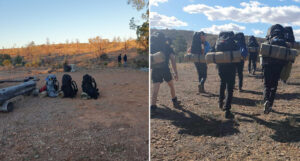Overcoming challenges and stepping towards success
20 June 2025
Stepping outside of their comfort zone and challenging their limits helped unlock growth and a sense of pride amongst a troop of 10 young people in care as they tackled an eight-day hike through the Flinders Ranges.
Accompanied by two AnglicareSA Placement Support Workers, the group of girls and boys aged 14-17 trekked more than 70 kilometres through the ranges at Yankaninna Station, all while carrying heavy packs, preparing their food, and completing leadership tasks and outdoor adventure activities including a high-ropes course.
Northern Foster Care supervisor Rhiannon Bitar said she had previously been involved with Operation Flinders on several hikes and saw it as an opportunity to provide young people in care a unique and challenging experience to push past their boundaries.
“With the foster care cohort that we work with, we have young people who have gone through significant trauma and quite hard upbringings up until this point,” Rhiannon said.
“I thought it would be a good opportunity for them to have that experience and to be challenged and pushed out of their comfort zone to really grow into their own potential.
“It gave them a real understanding of where their limits lie and perhaps that their previous way of thinking of what they could achieve was considerably less than what they actually can achieve.”
The young people were supported by Mwajemi Hussein and Matthew Holland from the Foster Care Services team, who also had to take on the challenge of the journey.
A lover of hiking himself, Matthew said the Operation Flinders trek proved to be a challenge for everyone.
“I love hiking, and I loved the experience of hiking,” Matthew said. “But this is designed to be more challenging than your average hike, so I acknowledge that it was a real opportunity to encourage each of the young people to push beyond the limits of what they thought they had.
“Climbing the highest peak at Mount Rose was a highlight for everyone, particularly for a couple of the young people who thought they couldn’t do that.
“Having them say, ‘look, I can’t really continue on’ but choosing to continue and overcoming the challenge was inspiring.”

Such was the success of the trip, Rhiannon said she was keen to plan more in the future which also helps to forge stronger relationships with the young people in care supported by AnglicareSA.
“In our role we do kind of take a backseat sometimes in our relationship with the young people,” Rhianon said.
“We have more of a relationship with the carers, so being able to have that different context of interaction I think was really beneficial and it was a physical and emotional challenge for Mwajemi and Matthew.”
The Operation Flinders hikers recently celebrated their success with a morning tea and presentation of awards, with one reflecting on her pride at taking on the challenge and succeeding.
“I think that it made me feel quite surprised because I haven’t done anything like that before in my life,” she said.
“I enjoyed the food and the warm campfires. The stars at night were so beautiful, you could see the Milky Way, which was absolutely incredible.
“The things that challenged me were the high ropes and climbing mountains. When you get to the top of the mountains you look over the top and it gives you the creeps, but the view was amazing.”
For Matthew, the morning tea was a final opportunity to remind the young people of how far they had come and what we they had achieved together.
“Some of them have used that experience in deciding to take increased responsibility for themselves,” he said.
“We’ve already heard that there’s been quite a noticeable difference for some of them once they got home, in terms of saying, ‘yeah, I want to take responsibility, I want to be part of things a bit more rather than just to wait for things to happen’.”
The Operation Flinders Foundation began in 1991 with a mission to transform young people’s lives through evidence based remote, outback intervention programs.
Through participating in the program, young people are also able to gain 20 Stage One (Year 11) credits towards their South Australian Certificate of Education under the banner of Recognised Community-developed Programs.